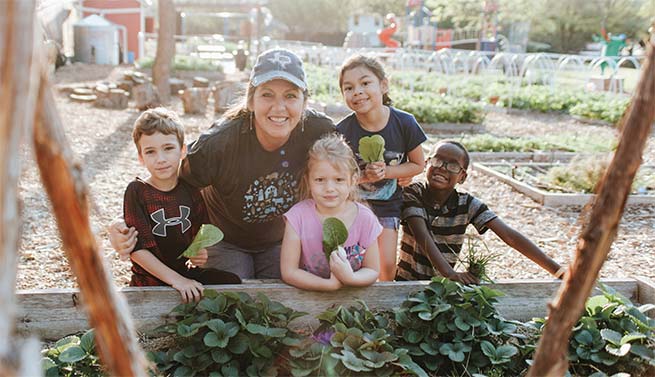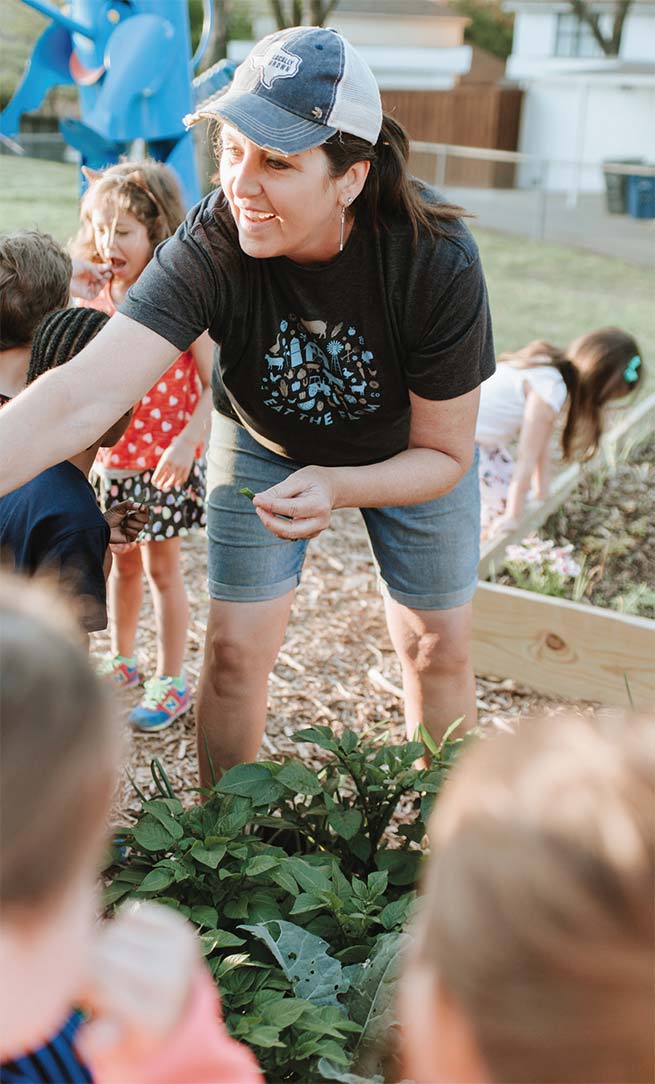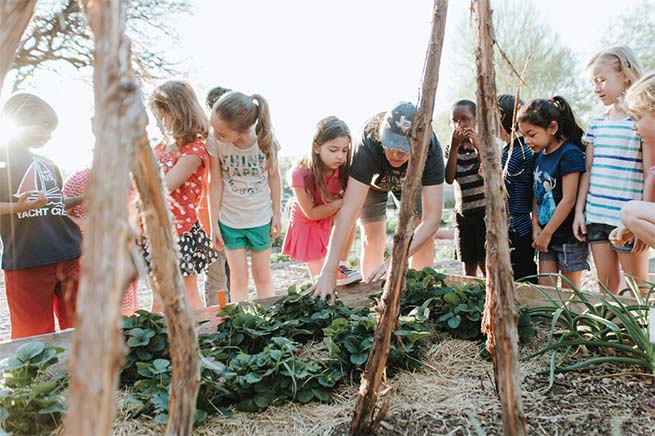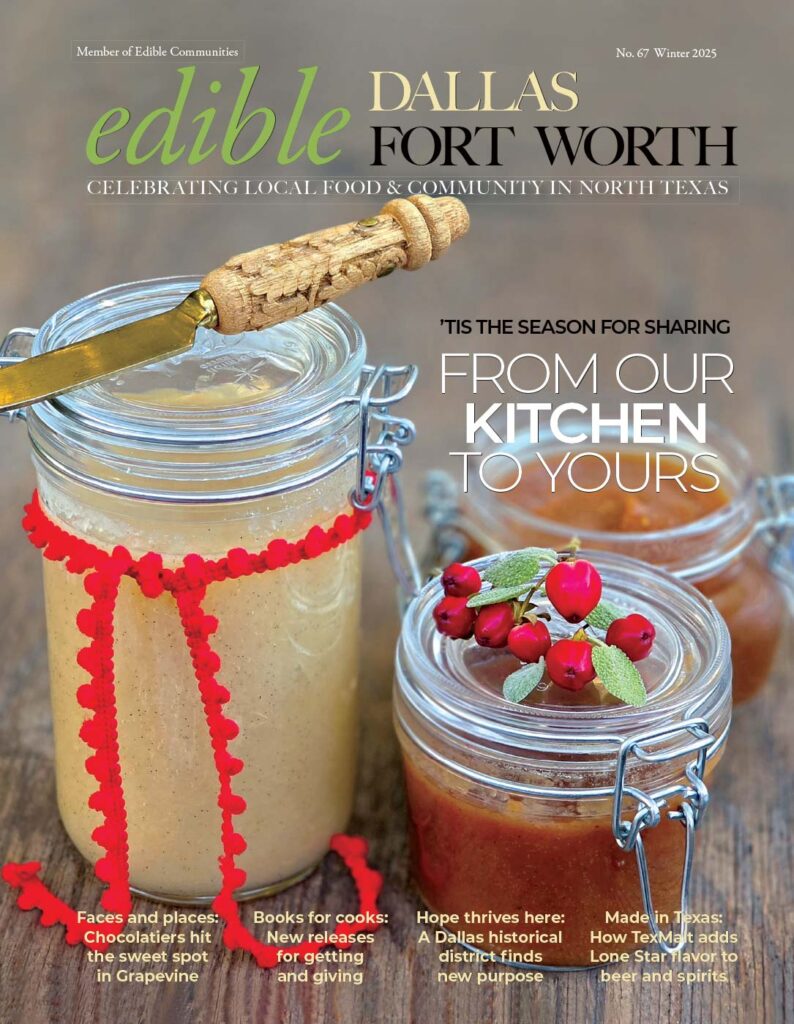Moss Haven Farm director Kim Aman with students.

Photography by Mandy McGeath
For families who rely on the North Texas Food Bank, the vine-ripe tomatoes, crispy greens, tender squash and crunchy bell peppers stand out as a welcome addition to the usual offerings of canned goods and boxed staples. What recipients might be surprised to learn is that a sizable portion of that produce was grown not by a rural, overalls-clad farmer, but by hundreds of young students at Moss Haven Farm, an urban school garden in Dallas’ Lake Highlands area.
Located at Moss Haven Elementary School, the garden has approximately 1,000 square feet of raised-bed growing space and a slightly larger area for conventional row crops. It is both a prolific, small-farming operation and a STEM-based outdoor classroom. (STEM stands for science, technology, engineering and math.)
Each Moss Haven student—from the youngest kindergarteners to the sixth graders—contributes to its upkeep. “Every student gets a 30-minute lesson in the farm each week,” says the farm’s program director Kim Aman, a retired schoolteacher. “It’s kind of like a special rotation. You have your art and P.E. and music. Here, they go to farm, too.” They turn over the ground, sow seeds, pull weeds, water crops, harvest produce and, on occasion, sell their excess microgreens at area farmers markets—valuable, hands-on experience that allows them to bring their textbook lessons to the real world.
Each student keeps a farm journal that they begin in kindergarten and continue through the sixth grade. Says Aman, “We work on lessons in science, health, the environment, math, and I’m real big on nutrition. We also connect social studies and history by learning about historically significant plants through time. Last year, we planted garlic from all over the world, and we studied which one would grow best in Texas.”
With help from the Dallas County Master Gardeners, the school also built up a native plant garden nearby that teaches the children about local flora, pollinators and the natural ecosystem. “We also have a pocket prairie that has all the grasses that would be growing in Dallas if not for all the concrete and houses and apartments,” says Aman.
Beside the school garden, a chicken coop houses lessons in egg production while the chickens themselves have become local celebrities.
For the past three years, Moss Haven Farm has been the headquarters for the annual A Peep at the Coops tour, which serves as one of its biggest fundraisers. “We celebrate our chickens,” says Aman. For two years in a row, they’ve been recognized at the State Fair of Texas for egg quality, winning Best Egg in Texas.
The farm got its start in 2012 after a group of parents wanted an outdoor learning garden like they’d seen at other schools. Aman was still a classroom teacher at the school. She says one mother was especially motivated and rallied a group of moms to approach the administration.
“When they first came up with the idea, the principal said, ‘Go talk to Kim,’” Aman says, “because … I was always taking my students outside for all kinds of things. So, we were matched up, and then they took the idea to the Richardson Independent School District, and the district greenlighted it. One of the moms was an avid gardener; one was really into health and nutrition. We had a team of moms that wanted to do it. I had always wanted to do it, but I knew I couldn’t do it by myself.”


Farmer Kim’s lessons and hands-on experience help students connect with their food
Aman acknowledges that managing a successful school garden is a difficult business. “The average school garden in the United States lasts two years,” she says. “People move. People get tired. In the summer the gardens don’t get weeded, and then the garden grows into a jungle, and no one wants to go out and get started. Teachers just don’t have the time to do a garden. … The school gardens that are sustainable are managed by someone who takes ownership in it.”
Aman credits that group of eager moms and dads who show up to work days, along with volunteers from the community, with keeping the farm thriving.
“We have work days five times a year,” she says. “ … Right now a group of dads is building a shade structure. They’re architects and engineers … It’s the old farm way where if you needed a barn raised, everybody was there. If you needed to harvest crops, everybody was there.
“But, the kids do a lot of the work themselves. If the monarch butterflies are migrating, we’re going to go manage monarchs. If we need to put frost cloth over the garden because it’s going to freeze, we do that … If we need to move compost, the kids move compost. There’s 450 kids at our school, and their attention spans are like 15 minutes, but 450 times 15 means there’s a lot of work that can get done.”
Aman is a seventh-generation farmer with a wealth of experience. She’s also the national and international chair for a Dallas chapter of the Slow Food movement. As such, she’s conferred with garden educators from throughout the country and served as a delegate to an international Slow Food conference in China, where chefs, food advocates, farmers and others from around the globe met to discuss issues related to good, wholesome food.
Aman says that being active in the Slow Food community allows her to bring a larger world of food to her students. She helps them learn how to prepare and enjoy the fresh produce they pick and teaches them how to think about connecting what they eat with how they feel and perform—lessons Aman hopes will shape their lifestyles as they grow into adults.
But perhaps more important than the practical knowledge these young minds gain is the joy of giving to others and learning how everyone shares responsibility for taking care of each other. The produce they grow is largely destined for both the North Texas Food Bank and food ministries in the Richardson I.S.D. In the past three years, they’ve donated more than 5,600 pounds of fresh, healthy produce to help those in need.
This year in an exit survey, the kids were asked what mattered most to them about the garden. Many answered growing food and giving it to those in need. Says Aman: “You hope the children grow up seeing the importance of eating healthy, local, farm-fresh, fresh food, but also to see the importance of giving back and helping other people. The kids—they love that.”
MARSHALL HINSLEY is a writer and photographer who lives with his wife on a 40-acre farm south of Dallas. With a passion for growing sweet, vine-ripe specialty melons, he's also a sustainable farmer whose mission is to grow food crops in a way that improves the ecosystem and benefits wildlife as well.
- Marshall HInsley
- Marshall HInsley
- Marshall HInsley
- Marshall HInsley
- Marshall HInsley
- Marshall HInsley
- Marshall HInsley
- Marshall HInsley





